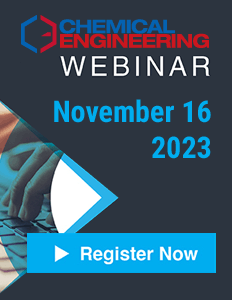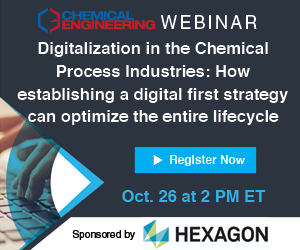Webinars
So you’ve started to digitalize your calibration program…now what?
FREE | December 13, 2023
REGISTERJoin us as we navigate the crucial steps to leverage digitalization effectively, starting with optimizing due dates for calibrations and aligning them with available resources. Learn to streamline your processes by tracking standards like multi-function calibrators, weights, and more for enhanced efficiency. Embrace courage as we guide you through evaluating and trimming redundancies in your calibration process. Discover the data-driven approach to calibrating intervals based on historical trends, ensuring precision without the risks of under or over-calibration. Join us for valuable insights and strategies under the theme “So you’ve started digitalizing your calibration program… now what?”

Webinar with Dow: Unleash the Power of Hybrid Modeling for Process Design and Optimization
FREE | December 7, 2023
REGISTERFor decades, first principle models have been used for process design and optimization in the chemical industry. Recent innovations employ machine learning techniques—enriched with first principle constraints—to create a hybrid model that closely represents real plant behavior. Fast, easy access to industrial AI is helping organizations make accurate decisions to select an optimum design quickly and improve operations, maximizing productivity and minimizing energy usage.
During this webinar, AspenTech experts will be joined by Reza Haghpanah of Dow to discuss how the company leveraged Aspen Hybrid Models™ to:
- Develop a data-driven model of a highly integrated process
- Achieve a more accurate and comprehensive representation of the process, creating optimization opportunities
- Increase productivity of the process by 10-15% with optimum operating conditions
Learn how you can transform your operations with hybrid modeling.
There will be a Q&A session following the event. We encourage you to join the conversation by submitting questions when registering.
By registering for this webinar, your contact information may be shared with our co-sponsor, Access Intelligence, LLC. Please click here to view data privacy policies.

Innovative Solutions for Sustainable Power: Navigating Regulations and Enhancing Efficiency
FREE | November 16, 2023
REGISTERJoin us for a thought-provoking webinar that delves into the dynamic world of the power industry, where technology and innovation intersect with sustainability and regulatory compliance. In “Innovative Solutions for Sustainable Power,” we will explore cutting-edge strategies for modernizing legacy systems, embracing automation and AI, and ensuring that digital projects drive business value while meeting regulatory requirements.
Our expert panel of industry leaders will discuss the latest advancements in power generation, emphasizing the critical role of technology in reducing emissions and optimizing energy production. Discover how power companies can navigate complex regulatory landscapes, address environmental concerns, and create a more sustainable future for generations to come.
Key topics include:
• Leveraging technology for sustainable power generation
• Modernizing legacy systems for greater efficiency
• Harnessing the potential of automation and AI in the power industry
• Strategies for regulatory compliance and stakeholder engagement
• Successful execution of digital projects that drive business value
Don’t miss this opportunity to gain insights into the power sector’s future, where innovation, sustainability, and regulatory compliance converge to shape the industry’s landscape. Join us and be part of the transformation toward a greener, more efficient power generation future.

Beyond ProcessBook & PI Vision: Exploring Today’s Industrial Analytics Tools
FREE | November 28, 2023
REGISTERIn the Manufacturing 4.0 era, industrial organizations have more data at their fingertips than ever, offering the promise of higher production rates, more consistent quality, and reduced costs through data-driven strategies.
Standing between many businesses and this promise of process optimization are questions surrounding the right tools to harness this data effectively – a choice complicated by the shifting status of longtime standard OSIsoft’s ProcessBook and PI Vision applications.

Digitalization in the Chemical Process Industries: How establishing a digital first strategy can optimize the entire lifecycle
FREE | October 26, 2023
REGISTERThe chemical process industries (CPI) are a diverse set of manufacturing sectors, each with its own set of concerns and requirements. However, a common thread among the sectors is an effort to leverage digital tools to improve the safety, profitability and sustainability of the entire asset lifecycle. Because the fields related to digitalization — such as artificial intelligence, industrial internet of things (IIoT), cloud computing, cybersecurity and others – are evolving quickly, it can be difficult to get a handle on the current state of affairs within the industry, as well as to discern where the digitalization journey will take the industry in the future.
This question-and-answer panel discussion will bring together experts who engage with digitalization in the CPI as a major part of their duties, and who have thought about how the deployment of new digitalization technologies will affect every aspect of industry, including how it fits into a world increasingly focused on environmental, social and governance (ESG) sustainability.
The speakers will share their experiences working with CPI companies on digitalization projects, recent research and analysis carried out to find information in this area, and how the CPI can learn from not only its own history, but also from the experiences of other heavy industries. Please join us for an engaging discussion, and bring your own questions for the speakers to address in the live Q&A session.

Securing Hydrogen Infrastructure: Using Safety as a Model for Cybersecurity
FREE | November 8, 2023
REGISTERThe burgeoning hydrogen economy holds immense potential in the fight against the global climate crisis. Its rapid expansion necessitates vigilance in safeguarding our critical infrastructure. This webinar draws inspiration from the evolution of human safety programs, which transformed from isolated initiatives into integrated programs driving safety-centric corporate cultures. In parallel, we seek a new era in cybersecurity—one marked by cohesion, comprehensiveness, and commitment to continuous improvement.
Delving deeper, we illuminate the parallel evolutionary paths of human safety and cybersecurity, emphasizing the need for dedication to bolstering cyber resilience. Our webinar advocates for shifting from passive regulatory compliance to a proactive ethos, with individual accountability and responsibility emerging as the driving forces fortifying our cybersecurity defenses. Attendees will learn valuable insights and pragmatic strategies shared by our industrial cybersecurity expert. This experience empowers you to cultivate a cybersecurity culture echoing the successes of current safety programs, fostering cross-functional collaboration, charting a persistent course for continuous cybersecurity improvement, and navigating the regulatory landscape with confidence.
Together, we can embark on this transformative journey towards a secure hydrogen future. Here, the enduring lessons of human safety programs serve as guiding principles illuminating the path to cybersecurity maturity. Our collective efforts will ensure that the hydrogen industry not only flourishes but securely thrives in an era defined by digital interconnectivity and rapid growth.

3 strategies to maximize technology in your capital projects
FREE | October 19, 2023
REGISTERIn recent years, digital technologies have changed the way chemical companies operate. These technologies have enabled information to become available when and where it is needed, allowed processes to become simulated in a virtual environment before being implemented on-site, made it possible for plant operators to be more mobile, and much more.
So, what do you do when you are building a completely new plant where your options are theoretically endless? How do you decide which technologies to employ and ensure they are truly integrated to create the biggest impact on your project? Where do you even start?
Join us for this webinar to find out how a large chemical manufacturer tackled this exact challenge. Based on the learnings from a large capital project, Tony Lee, a Production Engineer/Supervisor from Evonik, will shed light on the thought process that went into making technology decisions and specific areas of the project that were impacted as a result. Mr. Lee will be joined by Todd Hassel, who is a Regional Account Manager with Siemens Industry.
Don’t miss out on this opportunity to discover how to maximize your investment in digital technologies.

How to prevent solids and powder flow stoppages with proper feeder design
FREE | October 18, 2023
REGISTERHandling powders and bulk solids can be considerably more challenging than dealing with liquids and gases. These difficulties often arise due to a lack of adequate training, leading to a reliance on trial-and-error methods. Bulk solids and powders frequently encounter various flow challenges, including bridging, ratholing, flooding, and inadequate flow rates, and more.
Many of these flow issues can be traced back to improper discharger or feeder designs. Effective feeder design not only enhances the flow within bins, hoppers, and stockpiles but also positively influences product quality. Join our webinar to gain valuable insights into common feeder-related flow problems and receive essential design recommendations that can significantly benefit your operations.

Take the Pressure Out of Regulator Selection
FREE | September 26, 2023
REGISTERPressure regulators play a crucial role in maintaining and controlling pressures in industrial fluid and instrumentation systems, and selecting the right ones is important to keeping those systems operating properly. To avoid inefficiency, poor performance, frequent troubleshooting, and potential safety hazards, it’s important to understand:
• Different types of regulators available
• How these various regulators function
• How they can be applied to suit your system
Need help? Don’t miss this webinar. Join us as Shaji Arumpanayil, our pressure regulator product manager, explains what you need to know about pressure regulators and the nuances of your fluid systems to find the best option for your needs.

Chemistry is NOT only, when it stinks and bangs… Save 90% Time and Energy through more effective Mixing and Dispersion Technology
FREE | October 5, 2023
REGISTERHomogeneous mixing and high-shear dispersion are core processes in chemical process technology. We would like to introduce you to three typical ystral processes that can accelerate numerous processes in the chemical industry. Time and energy savings of up to 90% are certainly not uncommon. Whether in the production of resins, plastics, pesticides, lubricants, cleaning agents or many others, effective machines and systems are needed everywhere.
Conventional agitators create a horizontal rotation in the liquid. This hinders the vertical exchange of substances. You can agitate for hours, but the mixture never becomes completely homogeneous. ystral Jetstream Mixers, on the other hand, use a consistently vertical mixing principle. This way, everything is mixed completely homogeneously from bottom to top, usually in less than three minutes. The difference is enormous.
With our high shear dispersing machines, we move intensive processes out of the process tank and into an external loop. This not only speeds up processes, but all the processing conditions can be controlled much better.
When using our Conti-TDS machines, it’s all about dust-free powder processing, safe handling of hazardous substances, avoiding respirable dusts and vapors, explosion protection and maximum dispersion to fully utilize the components in the final product. And the final products are diverse: man-made fibers, conductive films, anti-graffiti or flame-retardant coatings, PU foams, silicone rubber, sol-gel processes, protective colloids for PVC production, release agents for tire production and much more. There are hundreds of applications in which optimized dispersion achieves advantages in the process and also in the ultimate product.
